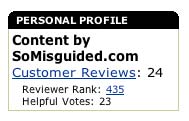While I was away skiing last week, two great studies were made public on the state of the publishing industry.
The first is the Publishing Trends survey on online marketing.
You may recall that in January I wrote about the Publishing Trends survey. Publishing Trends surveyed book publicists and book media on their actions and predictions for online book marketing. Well, the results are in.
Quote:
It’s unanimous. Publicists think online is the way to go for promoting their authors’ books … Nearly all (70.9%) publicists said they devote up to 50% of their resources to online marketing. The remaining said they do even more.
The full article analyzing the data can be found on the Publishing Trends website.
A quick look at the findings shows that publishers are holding back on online marketing budgets for the same stupid reasons that the Canadian industry as a whole is.
– Not having enough time to explore it (67.1%)
– Cost (52.9%)
– Lack of technology know-how (31.4%)
– Luddite bosses (5.7%)
Ridiculous.
The whole article is here.
But let’s talk more about this in relation to the second study that I want to mention.
I was thrilled to read in the Saturday Globe and Mail that The Book Retail Sector in Canada study report was officially released.
What is The Book Retail Sector in Canada study report?
Turner-Riggs, a Vancouver strategy, marketing and communications company (who are also friends of mine and business colleagues), were commissioned to do the study. I am excited to see it in print, primarily because, as The Globe and Mail says, it is an “essential reference work” for the industry and policy makers alike, and secondarily because I contributed to the research and writing for the chapter on online book retail.
The Book Retail Sector in Canada was published last week by the Department of Canadian Heritage and is available online in PDF and HTML editions, and in both official languages.
Here is the Table of Contents for the Department of Heritage Book Retail Sector in Canada.
In the Online Book Retail section you’ll see information on the overall online environment in Canada (and again, I’ll mention that the same perceived restraints are holding back publishers–lack of experience, lack of knowledge, too costly, too technical).
But what these fears really show is a gut decision rather than a logical decision.
We live in a world with many, many books. Perhaps too many. In Canada alone there were 17,000 new titles published in 2004 and the numbers continued to rise. These are new titles!
Where do book buyers and readers turn to discover new titles? They go online. They receive emails from friends with suggestions. They have books “chucked” at them in Facebook.
What is clear from the study is that the current bookselling environment is affected by market factors present in the broader economic landscape. We’re seeing a concentration of market share among large retailers; the emergence of non-traditional and online sales channels; the impact of exchange rates on Canadian prices; and the growth of supply and demand of cheaper or discounted products.
So looking at the Publishing Trends survey of what’s going on in North America (in particular in the US) and looking at the Heritage study on the state of book retail in Canada, Canadian publishers really need to start paying attention to this sales and marketing channel.
Waiting to see what happens is not going to help you in this scenario.
What do I suggest? Well read both studies.
Then, because online spend is a reflection of gut instincts, have a look at the painful positions of Microsoft and Yahoo in relation to Google. Here are two companies who waited to see what was going to happen in the online arena. Now what does your gut tell you?
==============
UPDATE:
Darren makes some sound arguments about the faulty wording of the Publishing Trends survey. In particular, he points out the assumptions being made regarding the data are rather loose.
I have to agree.
On SocialMediaReady.com I posted the following comment:
Quote: Good points Darren. In fact, I was weary of the study and even contacted them about the questions and what they were trying to accomplish. Some of the questions seemed aimed at online media who receive pitches and some of the questions seemed aimed at publicists who do the pitching. It was very weird and I must say I doubt the scientific nature of the study. However, I think there are some interesting comments in the overall article about how online marketing is perceived.





